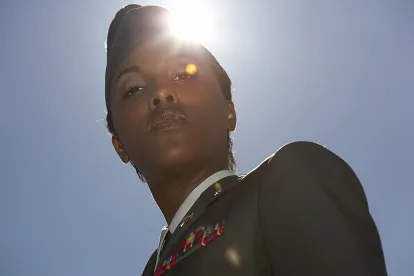The Department of Veterans Affairs will be required to implement mandatory set-aside requirements for procurements at all levels, including FSS orders, if two or more VOSBs reasonably can be expected to submit offers that permit an award at a fair and reasonable price.
The US Congress passed the Veterans Benefits, Health Care, and Information Technology Act of 2006 (the Act),[1] to increase contracting opportunities for veteran-owned small businesses (VOSBs) and service-disabled veteran-owned small business concerns (SDVOSBCs). Four principal components of the Act include the following:
-
The requirement that the US Department of Veterans Affairs (VA) establish VA-specific contracting goals for VOSBs and SDVOSBCs to improve the agency’s own contracting performance with these entities
-
Permissive authority for VA contracting officers to use methods other than competitive procedures (including sole-source contracting) when entering into a contract with VOSBs and SDVOSBCs for an amount less than the simplified acquisition threshold (currently $150,000)
-
Permissive authority for VA contracting officers to use methods other than competitive procedures (including sole-source contracting) when entering into contracts with VOSBs and SDVOSBCs for amounts above the simplified acquisition threshold (currently $150,000) and not more than $5 million, if, in the estimation of the contracting officer, a contract award can be made at a fair and reasonable price that offers the best value to the United States
-
For purposes of meeting VOSB and SDVOSBC goals under the Act, application of the “Rule of Two”—a mandatory requirement that VA contracting officers award contracts on the basis of competition set aside for VOSBs and SDVOSBCs whenever they have a reasonable expectation that two or more VOSBs or SDVOSBCs will submit offers and that the award can be made at a fair and reasonable price that offers the best value to the United States
Soon after the Act’s passage, the VA took two actions effectively to neutralize the benefits of the statute to VOSBs and SDVOSBCs. First, in 2008, it promulgated a regulation requiring VA contracting officers to place orders against Federal Supply Schedule (FSS) contracts[2] for Schedule 65 Medical, Dental and Veterinary Equipment and Supplies (including drugs) and Schedule 65 Instruments and Laboratory Equipment and not enter into open-market contracts for such products if they were available on an FSS contract.[3] Second, in 2009, the VA issued a final rule declaring that the mandatory preferences that Congress established through the Act did not apply to any of these FSS orders.[4]
Multiple VOSBs and SDVOSBCs subsequently protested VA FSS orders placed with entities other than VOSBs and SDVOSBCs on grounds that issuance of the orders violated the Rule of Two. Notably, Kingdomware Technologies, Inc. (an SDVOSBC) filed a bid protest with the US Government Accountability Office (GAO) protesting the VA’s issuance of an FSS order for employee emergency notification services to a non-SDVOSBC entity after the VA’s own market research established that there were more than 20 SDVOSBCs that held FSS contracts for the required services. The VA argued that it need not consider VOSB/SDVOSBC set-asides under the Act for orders placed through the FSS program. GAO disagreed on grounds that the Act required that the VA “shall” conduct its procurements, including FSS acquisitions, using an SDVOSBC set-side when the Rule of Two is satisfied and sustained Kingdomware’s protest, recommending that the VA resolicit the requirement for employee emergency notification services as an SDVOSBC set-aside.[5]
The VA refused to perform in accordance with GAO’s recommendation and, in response to an earlier GAO decision that resolved another contractor’s protest on this same issue, went so far as to issue a memo to all VA acquisition and procurement officials stating that the GAO’s recommendation and its interpretation of the Act should not be followed.[6]
Because GAO decisions are not binding on agencies, Kingdomware filed a bid protest in the US Court of Federal Claims. The VA argued that the Act required application of the Rule of Two only when the secretary of the VA determines that doing so is necessary to meet the goals set by him or her pursuant to the Act, and that the agency’s interpretation of the Act as not requiring the VA to set aside each and every acquisition for SDVOSBCs and VOSBs before ordering against the FSS was reasonable and consistent with both the statute and the legislative history. Deferring to the VA’s interpretation, the court held that it was reasonable and denied Kingdomware’s protest.[7] On appeal, the US Court of Appeals for the Federal Circuit[8] found the Act unambiguous in requiring only that the VA apply the Rule of Two as necessary to meet the goals established pursuant to the Act and permitting the VA to order through the FSS program without applying the Rule of Two as long as the VA can meet its goals.[9]
In a final attempt to compel the VA to comply with the Act’s requirement that the VA “shall” apply the Rule of Two to all contracts entered into by the agency, Kingdomware filed a petition for certiorari at US Supreme Court. The Supreme Court granted the petition, and, in a decision issued on June 16, 2016, held in favor of Kingdomware. Specifically, the Court held that “the Rule of Two contracting procedures [under the Act] are not limited to those contracts necessary to fulfill the Secretary’s goals under [the Act]” and that the Rule of Two “applies to orders placed under the FSS.”[10]
In reaching its decision, the Court explained that the Rule of Two’s prefatory clause, “for the purposes of” meeting annual contracting goals, has no bearing on whether the Rule of Two requirement is mandatory or discretionary, stating that “[t]he clause announces an objective that Congress hoped that the Department would achieve and charges the Secretary with setting annual benchmarks, but it does not change the plain meaning of the operative [shall] clause.”[11]
Further, the Court addressed an issue that it stated had not been raised by the VA in the courts below, namely, that the Rule of Two does not apply to “orders” under “pre-existing FSS contracts.” In addressing this issue, the Court held that the statute “applies when the Department ‘award[s] contracts,’” and then concluded, “[w]hen the Department places an FSS order, that order creates contractual obligations for each party and is a ‘contract’ within the ordinary meaning of that term,”[12] reasoning in part that “the underlying FSS contract gives the Government the option to buy, but it does not require the Government to make a purchase or expend funds.” Although FSS contracts are considered indefinite delivery/indefinite quantity contracts under which the government must purchase a minimum amount to obligate a contractor’s performance,[13] in effect, the Court equated FSS contracts with blanket purchase agreements and basic ordering agreements, which give rise to a series of contracts and do not bind either party until an order is accepted. Finally, relying on the increased use of the FSS program to satisfy complex agency requirements, the Court refused to distinguish between ordinary supply orders and task orders that incorporate a statement of work.
How the VA will implement the Rule of Two in the wake of the Court’s decision remains to be seen. For example, the decision left open the possibility that the VA could limit its search for eligible VOSBs and SDVOSBCs to FSS contract holders, thereby preserving the FSS as a mandatory source of supply at the VA.
Key Takeaways
-
The decision directly affects VA purchases only.
-
However, for the VA and its contractors, the implications are enormous. Under the Act, as interpreted, unless the VA decides to sole source to a VOSB or SDVOSBC a contract of not more than $5 million, every VA requirement for which there are at least two VOSBs or SDVOSBCs likely to submit offers resulting in a fair and reasonable price must be set aside for VOSBs or SDVOSBCs. Where the VA elects to order required products or services under the FSS program, the result is the now the same, even for orders under the $150,000 small acquisition threshold. As such, the decision will likely expand opportunities for VOSB and SDVOSBC distributors and significantly affect the ability of large businesses with FSS contracts to act as prime contractors in the sale of their products and services to the VA.
-
The above is particularly true given the Small Business Administration’s recent final rule that increases small businesses’ ability to partner with large businesses and other small businesses without jeopardizing their small business status.[14]
-
It is unclear what the Supreme Court intended when it stated that the Act requires VA contracting officers to award contracts to VOSBs “using restricted competition whenever the Rule of Two is satisfied.” Many FSS orders to not have any outward indicia of competition. For example, for FSS orders of supplies and services under the simplified acquisition threshold (currently $150,000) that do not require statements of work, contracting officers are only required to “[c]onsider reasonably available information about the supply or service offered under [FSS] contracts by surveying at least three schedule contractors through the GSA Advantage! On-line shopping service” and are not required to issue requests for quotations.[15]
-
The VA refers to its implementation of the preferences established by the Act as The Veterans First Contracting Program. VOSBs and SDVOSBCs are reminded that, to be eligible to participate in the program (i.e., be eligible for VA purchasing preferences under the Act), they first must submit an application for formal verification of status to the VA Center for Verification and Evaluation. The application process requires detailed information regarding ownership, control, strategic policy and day-to-day management, level of veteran managerial experience and proof of veteran status, and submission of related documents.
[1]38 U.S.C. 8127, 8128.
[2] The FSS program allows the VA, through a delegation of authority from the General Services Administration, to award multiple contracts for commercial supplies and services and place orders under these contracts without always having to compete them. See generally FAR Part 8.
[3] 73 Fed.Reg. 2735 (Jan. 15, 2008).
[4] 74 Fed.Reg. 64624 (Dec. 9, 2009) (finalizing proposed rule dated Aug. 20, 2008).
[5] Kingdomware Technologies, B-406507 (May 30, 2012).
[6] Kingdomware Techologies, Inc. v. United States, 197 Fed.Cl. 226 ( 2012).
[7] Id.
[8] Kingdomware Techologies, Inc. v. United States, 754 F.3d 923 (Fed. Cir. 2014).
[9] Id.
[10] Kingdomware Techologies, Inc. v. United States, No. 14–916 (decided Jun. 16, 2016) (slip opinion).
[11] Id.
[12] Id. (emphasis added).
[13] FAR 16.504.
[14] See, SBA Amended Regulations Enhance Opportunities for Small Businesses.
[15] FAR 8.405-1.




 />i
/>i
